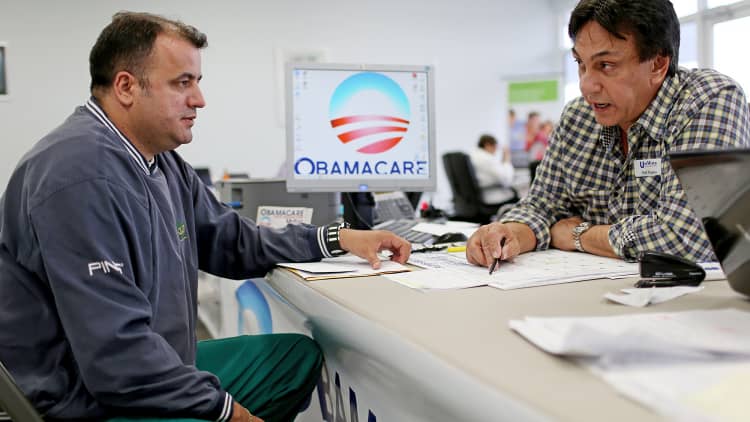
OK, let's try this one more time. Again.
A month after Obamacare's open enrollment season closed, the federal government Sunday starts a special enrollment period for people who only now are finding out they face a penalty for failing to have obtained some form of health insurance in 2014.
"We clearly are very hopeful that people will avail themselves of the chance to get covered, to get insurance during this period," said Kevin Counihan, CEO of HealthCare.gov, the federal Obamacare insurance marketplace that serves 37 states.
But it's unclear how many people will take advantage of that offer and end up adding to the 11.7 million people or so who already signed up for 2015 health plans on government Obamacare exchanges.
"We haven't set a projection," Sylvia Burwell, secretary of the U.S. Department Health and Human Services, said Thursday when CNBC.com asked her about the number of sign-ups she expected to see, during an event at Montefiore Medical Center in New York.
A survey released Monday by the Jackson Hewitt Tax Service suggested that many eligible people might not even know about the offer of what will amount to their third bite at the Obamacare enrollment apple.
The study found that 48 percent of adults believed the deadline to sign up for health coverage this year had expired, and another 27 percent "don't know" if the deadline had expired. While open enrollment for Obamacare insurance ended in most of the country on Feb. 15, special enrollment periods for tax season were announced in the week following that initial deadline.
Read MoreObamacare-canceled plans fell in2015
Counihan, in a conference call with reporters Friday, also said officials were working on getting corrected tax forms out to more than 800,000 Obamacare customers who had previously been sent forms that contained some incorrect information. But officials did not reveal how many of those corrected forms have been sent.
The forms are necessary for those tax filers to reconcile what they received in subsidies with what they are actually entitled to; 50,000 or so people who received the incorrect 1095-A forms had already filed their taxes at the time the error became public.
The grace period for signing up for a health plan this year is available to people who didn't have coverage last year and didn't know until this current tax season that there's a fine for not having such coverage. People using the special period also must not already be enrolled in an insurance plan for 2015. Those eligible for the grace period still have to pay any Obamacare penalty they are assessed for 2014.
The special enrollment period for customers of HealthCare.gov will run from Sunday through April 30. A top federal official said the grace period is a onetime deal: It will not be offered in future years.
Six other state-run insurance marketplaces, have already begun their own special enrollment period. Four others are starting such periods Sunday, and Connecticut is beginning its own special season on April 1.
Just three states, Colorado, Idaho and Massachusetts, are not having a special enrollment period.
Read MoreBig medical bills, too little cash
The decision to grant the special sign-up season reflects still-high levels of ignorance about Obamacare among uninsured Americans, and a lag in the timing of some of the law's provisions.
Beginning in 2014, most Americans were required to have some form of health coverage or pay a tax penalty equal to the higher of $95 per adult, or 1 percent of taxable household income. But that penalty is only being collected starting this year, with the filing of 2014 tax returns.
As a result, many people are becoming aware of that penalty only after the close of enrollment for 2015 health plans. If there were no special enrollment period available this year, some people would not only owe a penalty for 2014, they'd also next year would owe a penalty for failing to have insurance in 2015. The penalty for the 2015 tax season rises to the greater of $325 per adult or 2 percent of household income.
"We do know that there are people who still don't know about the fee," said Andy Slavitt, acting administrator of the federal Centers for Medicare and Medicaid Services, the agency that oversees Obamacare.
Slavitt cited a McKinsey study from earlier this week that found that about 40 percent of uninsured people were aware of the Obamacare penalty.
"We do know that are some people ... that didn't learn about open enrollment and didn't learn about the requirement to have coverage until they paid their taxes," Slavitt said. "For many people, this will be the first time they discover they have the opportunity to get coverage for themselves and their families."
This tax season is the first time that filers must declare their health coverage status.
Most filers, about 75 percent of them, will only be required to check a box on their tax returns to indicate they have some form of coverage, said Mark Mazur, assistant secretary for tax policy at the U.S. Treasury Department.
For people who do not have health coverage, "We expect the majority of them will qualify for exemptions" from the Obamacare penalty. Those exemptions can include not having the option to buy "affordable" insurance as defined under the law, having recently filed for bankruptcy, religious reasons and other categories.
Read MoreRetirees may shell out $220K for health care
People who received federal subsidies, or tax credits, to help pay the monthly premiums for plans purchased through Obamacare marketplaces are required to file forms reconciling the subsidies they received to what they ended up being actually entitled to given their income and the price of the plans.
While some of those people will have to pay the IRS some of their subsidies, "We expect the overwhelming majority of these taxpayers to still receive a net tax payment" in the form of a refund, Mazur said.


